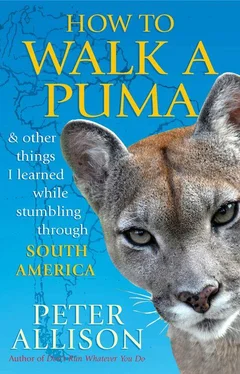‘It is not a real country,’ the guard said, crossing out ‘ Gales ’ and writing ‘ Inglatera ’ beside it.
Of course, the Welsh and English, despite being neighbours and ruled by the same parliament, have a contentious history that includes acts of colonial bastardry by the English that have not been forgotten by the Welsh. Calling a Welshman English is not the greatest insult imaginable, but may cost you some teeth if the Welsh person in question feels sufficiently aggrieved by it. As the Minke straightened to her full and imposing height, I started to fear we might just see the inside of a Bolivian jail before the day was out, so I grabbed her and said, ‘Choose your battles.’
She glared at me.
‘Of course Wales is a real country, he just can’t be expected to know that, what with Bolivia not playing rugby,’ I said.
She didn’t look convinced.
‘They don’t have schools here either,’ I added facetiously.
She laughed then and we were stamped in, and in no time we were back in the vehicle, shivering from our brief exposure to the bitter mountain air.
The temperature had gone from pleasant and sun-soaked in San Pedro to a harsh, windswept chill now that we had hit three and a half thousand metres. As the vehicle climbed further we passed larger lakes with the occasional pause for photos. Small herds of vicuñas scattered at our approach, their daintiness in stark contrast to their more famous relative, the camel. The lakes themselves were so saturated with naturally occurring minerals that the water ranged from red to green, with shades of blue and orange in between.
Despite their toxic appearance, each lake had a population of flamingos working the water, avocets too, and many smaller birds that took off before I could get close enough to identify them, probably alerted by my harsh panting. Every step up there felt like a marathon, and just climbing a rocky outcrop for a better view left me wrecked, condor bait—if there had been any condors around. This was without a doubt the most inhospitable place I had ever been to. Parts of this mountain range had never recorded rain, and temperatures ranged from scorching in the lowlands to the breath-fogging cold of the spring-fed lakes.
Our group was all European, apart from myself and Eduoardo, our driver, who was Bolivian. The Minke was, as noted, proudly Welsh, there was a French girl, a softly spoken young German man with spiky dyed-red hair, and a Polish couple. The Polish couple spoke no Spanish, but the woman had some understanding of English, so that—conveniently for me—became the common language.
‘Can you breathe?’ I asked the Polish woman as she stumbled up onto the rock beside me. All she did was pant in reply, waving at her mouth to indicate she couldn’t speak. So I guessed not. Not only had I not been at altitude for some time, I had never before been quite so high. Australia and Botswana, the countries where I have spent most time, are both markedly flat, their highest peaks mere pimples on the landscape compared to the Andes. I was struggling.
There’s a certain sheer bloody-mindedness that comes with being a bird watcher, that seemingly most passive of activities, and so when we reached our final destination for the day, the azure Lago Colorado, I was determined to get out there and see what new species I could spot from its shores. Lago Colorado is one of the only places on the globe where three species of flamingo can be seen, as well as many specialist high-altitude species with eponymous names like Andean goose, Andean avocet, and gasping foolfinch. (One of those names might have been made up while addled by lack of oxygen.)
There was nowhere near enough water in the vehicle for the group, and the dehydrating caffeinated drink the driver constantly sipped on would do me no favours, so I took what water could be spared and set off on what I thought would be a leisurely stroll. The flamingos were easy to find, as were several of the other larger species. It amazed me how diverse the bird life was—we had peaked here at four and a half thousand metres, a punishing altitude for anything with lungs, yet I easily saw twenty species of birds in a few hundred metres. For some reason, though, I was convinced that on the other side of the lake, only a half-kilometre around, would be more species that I had not seen before. There was no logical reason for this, but like many enthusiasts, bird watchers can become irrationally fixated. So I stumbled along, mouth open, ignoring the dizziness I felt and the weakness in my legs. A drab brown bird called a cinclodes lifted off in front of me, so plain that it could only delight the most hardened bird nerd; I was sufficiently inspired at this sight to carry on.
A natural spring fed the lake, and I soon found its outlet, which was bright green with algae. I was thirsty, having finished the bottle of water I’d brought, but feared drinking from even this most pure of natural sources might turn me green, like an anorexic Hulk.
I pushed on, spotting a few more species, my shoes now coated with dust as I could only drag my feet, not lift them. Eventually it dawned on me how stupid I was being—a remarkable moment of clarity considering how foolishly I’d been behaving to that point. I could barely breathe, and a mere stroll had me close to collapse. Now I had to get back.
As I looked over the flamingo-coated lake, our camp, less than a kilometre away, suddenly seemed impossibly far. I groaned, made a shuffling turn, and started retracing the drag marks my feet had left. ‘I’m too old for this,’ I thought, returning to my new favourite theme. This time though I didn’t mean I was too old for adventure, but too old for such stupidity. Getting back seemed improbable; doing it before blinding dark certainly so. The sky was turning the same shade of pink as the flamingos, and there was no source of artificial light between me and the camp. This was no place to spend the night and wait it out—exposure could kill up here, and soon I wouldn’t even have the energy to shiver.
I began dragging my feet again, a shambling figure. I’d told Lisa that I was going for a walk, but had neglected to mention exactly where I intended to go. How long would it be before they sent someone to look for me? If they had hardly any water in the car, would they have flashlights? This was not Chile but Bolivia, the country I’d expected to find in South America—undoubtedly charming, but chaotic and ramshackle. I felt such a fool as the light faded, too exhausted now to even lift my binoculars at what might have been a bird but was probably just an hallucination, the product of an oxygen-starved mind.
The lake edge had a gentle curve that I needed to follow back to the camp, with an ill-defined trail following the arc. I decided to cut a corner, but soon realised the folly of that as I sank almost to my ankles in rich, gluggy mud, weighing down my feet further. I was torn between the need to hurry to beat the setting sun and conserving energy by moving at a less lung-busting pace. From the outside I must have looked like an arthritic tortoise, but I felt even more decrepit. Earlier I had found the lack of oxygen and its effects a novelty—not pleasant, but a new experience and therefore worth savouring. Now it scared me. I felt like I was drowning on land.
One step, then another. I paused, leant over and rubbed my thighs. They ached, deep aches as though I’d run a marathon (not that I know from experience what that’s like). My mini-break over, I started moving again, making it only a few paces before stopping once more, my breathing now rapid and harsh, like a horny bull elephant that has spotted a breeding herd.
In the distance I saw a light come on, and realised it was from the arrangement of huts that made up our campsite. It was still distant, too distant, and it hit me that I wasn’t going to make it. The will that had driven me forward to see some different birds was absent now. And, incredibly, making it through the night was not as powerful a motivator. I sometimes joked that my lack of coordination disproved the theory of evolution, and my lack of will to survive now made it quite clear that this was true.
Читать дальше












